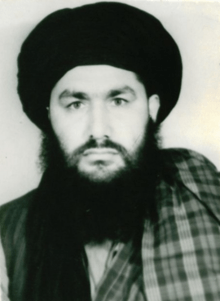Obaidullah Akhund
Mullah Obaidullah, the Akhund (Pashto: ملا عبيدالله آخوند) (died March 5, 2010) was the Defence Minister under the Taliban government in Afghanistan and later became an insurgent commander during the Taliban insurgency against the new Afghan government and the US-led NATO forces. He was captured by Pakistani security forces in 2007 and died in 2010 of a heart disease inside a prison in Pakistan.
Obaidullah Akhund ملا عبيدالله آخوند | |
|---|---|
 | |
| Defense Minister of Afghanistan | |
| In office 1996–2001 | |
| Personal details | |
| Born | c. 1968 Panjwai, Kandahar Province |
| Died | March 5, 2010 Karachi, Pakistan |
| Political party | Taliban |
| Military service | |
| Allegiance | |
| Years of service | 1994–2010 |
| Rank | Commander |
| Battles/wars | Soviet–Afghan War Afghan Civil War War in Afghanistan |
Taliban
Mulla Obaidullah was born in the Panjwai district of Kandahar Province in southern Afghanistan[1] and was believed to be born approximately in 1968. He is an Alakozai.[2] Obaidullah Akhund became the Defense Minister of Afghanistan in the 1990, and the second of three top deputies to Mullah Omar, the spiritual leader of the Taliban movement. Obaidullah was seen as the "number three" man in the Taliban.[3] In late 2001 or early 2002, Obaidullah surrendered to the Afghan Northern Alliance troops but was released as part of an amnesty.[4] He was one of the main military leaders in 2003 and was named to the Mujahideen Shura Council.[5] Abdul Latif Hakimi, who was captured by Pakistan in 2005, said that Obaidullah was one of two people with direct access to Mullah Omar and that Obaidullah had personally ordered insurgent attacks, including the killing of a foreign-aid official in March 2005.[1]
Capture and death
Obaidullah was captured by Pakistani security forces in February 2007 in Quetta, Pakistan.[3][6] He was the most senior Taliban official captured since the start of the present war in Afghanistan.[7] The arrest coincided with U.S. Vice President Dick Cheney's visit to Afghanistan and Pakistan in late February 2007, but the timing has been reported to be a coincidence rather than a reaction to Cheney's visit.[7]
Obaidullah was freed in November 2007 in exchange for the release of more than 200 Pakistani soldiers captured by the Taliban. He was rearrested in February 2008[8][9] and died on March 5, 2010, of a heart disease inside a prison in Karachi, Pakistan.[10][11]
References
- Gall, Calotta: "Pakistanis catch a top member of Taliban", page 4. International Herald Tribune, March 2, 2007
- Felix Kuehn, Alex Strick van Linschoten (23 August 2012). An Enemy We Created: The Myth of the Taliban-Al Qaeda Merger in Afghanistan. Oxford University Press. p. 481. ISBN 9780199977239.
- 'Taleban leader held' in Pakistan, BBC News, March 2, 2007
- "Profile: Mullah Obaidullah Akhund". Cooperative Research. Archived from the original on 2007-06-28. Retrieved 2007-03-05.
- Reuters, "Taliban names anti-US leadership council", June 24, 2003
- Pakistan braces for Taliban backlash after arrest, Reuters, March 3, 2007
- Report: Pakistan arrests one of Taliban's top three, CNN, March 2, 2007
- "Archived copy". Archived from the original on 2012-10-15. Retrieved 2011-11-07.CS1 maint: archived copy as title (link)
- "Pakistan rearrests Mullah Obaidullah". Long War Journal. Retrieved 15 February 2015.
- "Taliban announces death of ex-defense minister in 2010". Fox News. February 13, 2012.
- "Taliban announce death of ex-defense minister". Yahoo News. 13 February 2012. Retrieved 15 February 2015.